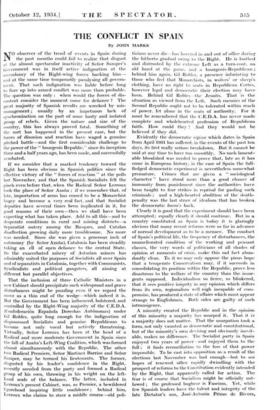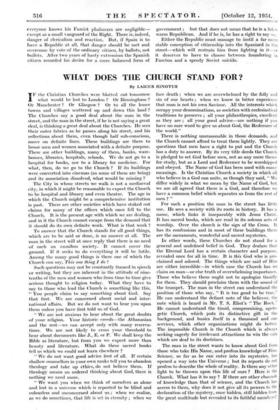THE CONFLICT IN SPAIN
By JOHN MARKS
NO observer of the trend of events in Spain during the past months could fail to realize that disgust at the almost spectacular inactivity of Senor Samper's Government was in itself active indignation at the ascendancy of the Right-wing forces backing him— and at the same time temporarily paralysing all govern- ment. That such indignation was liable before long to flare up into armed conflict was more than probable. The question was only : when would the forces of dis- content consider -the moment come for defiance ? The great majority of Spanish revolts are wrecked by mis- management; usually by an .impetuous lack of synchronization on the part of some hasty and isolated group of rebels. Given the nature and size of the. country, this has. always proved fatal. Something of the sort has happened in the present case,. but the forces of disunion and reaction have waged. a genuine pitched battle—and the first. considerable challenge to the power of the "bourgeois Republic," since its inception: three and a half years ago, has been made, and successfully combated.
If we consider that a marked tendency toward the Right has been obvious in Spanish politics since the effective victory of the "forces of reaction" at the polls last November, and that the Spanish Socialists felt the pinch even-before that, when the Radical Senor Lerroux took the place of -Senor Azafia ; if we remember that, of late, importation of arms has ceased to be a Monarchist bogey and become a very real fact, and that Socialist deputies have several times been- implicated in it, for good reasons of their own—then we shall have been expecting what -has taken place. Add to all this—and to desperate conditions in rural and mining districts—a Separatist outcry among the Basques, and -Catalan disaffection growing daily more troublesome. No more was needed. Since she was given a generous inch of autonomy (by Senor Azana), Catalonia has been steadily taking an ell of open defiance to the central State. So the exacerbated misery of Asturian miners has admirably suited the purposes of Socialists all over Spain and of separatists in Catalonia, together with Communists, Syndicalists and political gangsters, all aiming at different but parallel objectives.
That the inclusion of three Catholic Ministers in a new Cabinet should precipitate such widespread and grave disturbances might be puzzling even if we regard the move as a thin end of the wedge—which indeed it is. But the Government has been influenced, bolstered, and controlled by the Right-Wing majority of the C.E.D.A. (Confederacion Espanola Derechas Autonomas) under Gil Robles, quite long enough for the indignation of dispossessed Socialists and genuine Republicans to become not only vocal but . actively threatening. Virtually, Senor Lerroux has been at the head of a Radical and more moderate Government in Spain since the fall of Azatia's Left-Wing Coalition, which was formed almost simultaneously with the Republic. The other two Radical Premiers, Senor Martinez Barrios and Senor Samper, may be termed his lieutenants. The former, disgusted by his leader's confidence in the Right, recently seceded from the party and formed a Radical group of his own, throwing in his weight on the left- hand scale of the balance. The latter, included in Lerroux's present Cabinet, was, as Premier, a bewildered fg,urehead inspiring little confidence ; behind him, Lerroux who claims to steer a middle course—old poli- ticians never die—has hovered in and out of office during the hitherto gradual swing to the Right. He is loathed and distrusted by the extreme Left as a turn-coat, an old hand at the game, and a bourgeois-Republican ; behind him again, Gil Robles, a presence infuriating to those who feel that Monarchists, in wolves' or sheep's clothing, have no right to seats in Republican Cortes, however legal and democratic their election may have been. Behind Gil Robles—the Jesuits. That is - the situation as viewed from the Left. Such enemies of the Second -Republic ought not to be tolerated within reach of power, let alone in the seats of authority. For it must . be remembered that the .C.E.D.A. has never made- complete and wholehearted profession of Republican. faith. How could they ? And they would not be believed if they did.
Evidently the democratic regime which dates in Spain from April-1931 has suffered, in the events of the. past ten days, its first really serious breakdown. But it cannot be said at any time to have run smoothly. No such lament- able bloodshed was needed to prove that, lath as it has come in European history, in the case of Spain the full- fledged- democratic experiment is nevertheless somewhat premature. Crimes that are given a "sociological character " have stood more than a good chance of immunity from punishment since the authorities have been taught to fear strikes in reprisal- for gaoling such criminals ; and a high-hearted abolition of the death- penalty was- the last straw of idealism that has broken the democratic burro's back.
Clearly it is good that the experiment should have been attempted ; equally clearly it should continue. But in a country constituted as Spain is today it is glaringly obvious that many recent reforms were so far in advance of normal development as to be a menace. The conduct of Spain's political life, the frequency of disturbances, the unameliorated condition of the working and peasant classes, the very words of politicians of all shades of opinion at moments of crisis, make this sad fact abun- dantly clear. .To it we may only oppose the pious hope that a temperate Conservatism may, if it succeeds in consolidating its position within the Republic, prove less disastrous to the welfare of the country than the insur- gents supposed. Individualism so fierce, so blinkered, -that it sees positive iniquity in any opinion which differs from its own, regionalism well nigh incapable of com- promise, has produced a state of affairs which must appear -strange to Englishmen. Both sides are guilty of such intransigence.
A minority created the Republic and in the opinion of this minority a majority has usurped it. That it is a majority does not matter. That the usurpation took a form, not only vaunted as democratic and constitutional, but of the minority's own devising and obviously inevit- able, makes no difference. The Socialist party in Spain enjoyed two years of power—and enjoyed them to the full ; it finds reconciliation to the loss of that power impossible. To be cast into opposition as a result of the elections last November was bad enough—but to see hopes of renewed office rapidly dwindling with the prospect of reforms to the Constitution evidently intended by the Right, that apparently called for action. The fear is of course that Socialism might be officially out- lawed; the professed bugbear is Fascism. Yet, while few Spanish leaders have the talent and integrity of the late Dictator's son, Jose-Antonio Primo de Rivera, everyone knows his Fascist phalanxes are negligible— except as a small vanguard of the Right. There is, indeed, danger of clericalism and reaction. But, if Spain is to have a Republic at all, that danger should be met and overcome by vote of the ordinary citizen, by ballots, not bullets. After two years of hasty extremism the Spanish citizen recorded his desire for a more balanced form of government ; but that does not mean that he is a luke- warm Republican. And if he is, he has a right to say so.
Either the Republic Must manage to instil a far more stable conception of citizenship into the Spaniard in the street—which will restrain him from fighting in it—or it deserves to have to choose between foundering in Fascism and a speedy Soviet suicide.















































 Previous page
Previous page